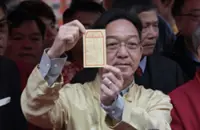Microplastic particles turned up in the vast majority of waste samples taken from Hong Kong wildlife in a Greenpeace study, the group said, suggesting that animals still ingest plastics even if they are not feeding in urban areas.
Yesterday’s report was released ahead of November talks in South Korea, where governments will be looking to seal a potentially groundbreaking deal tackling the problem of plastic pollution.





